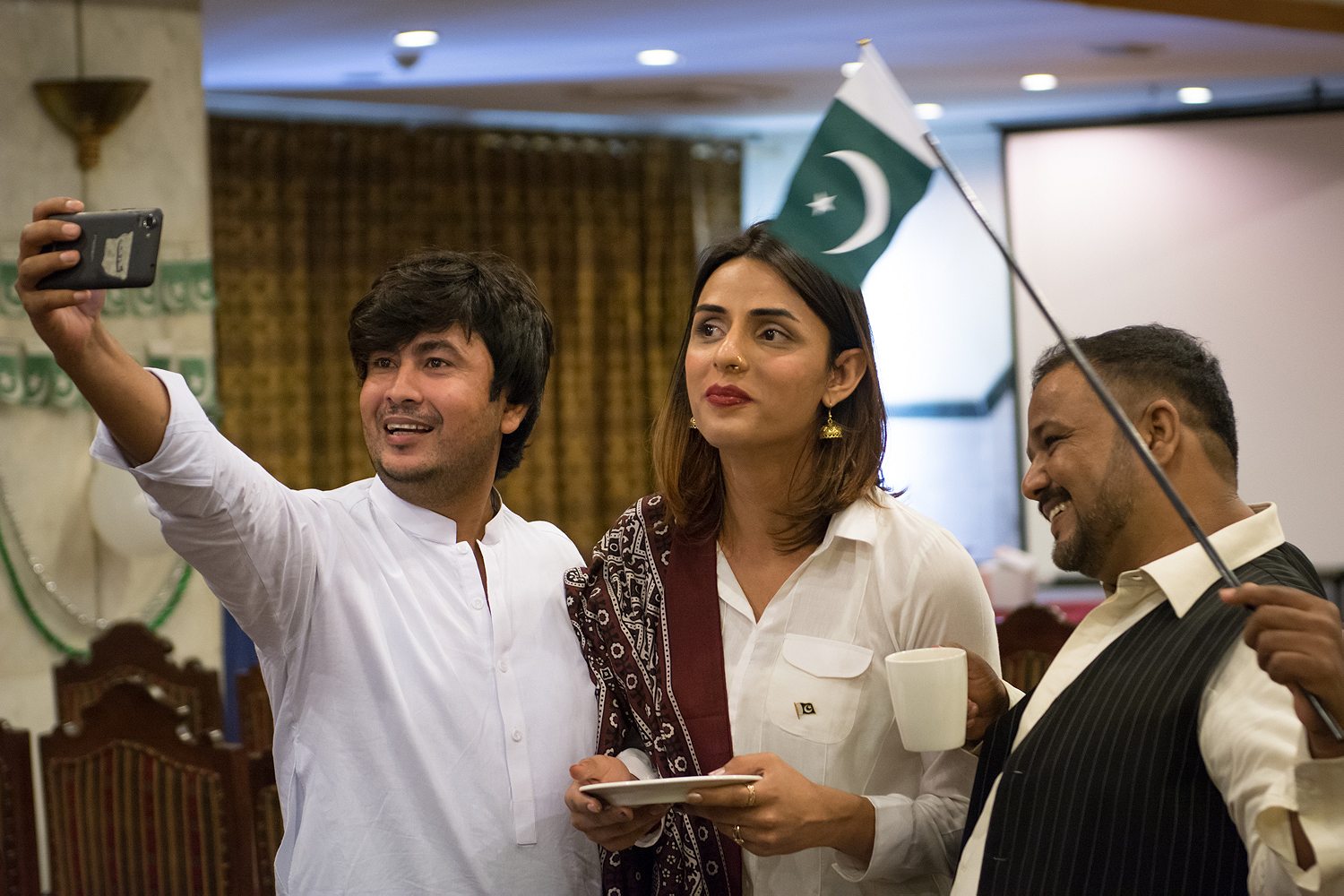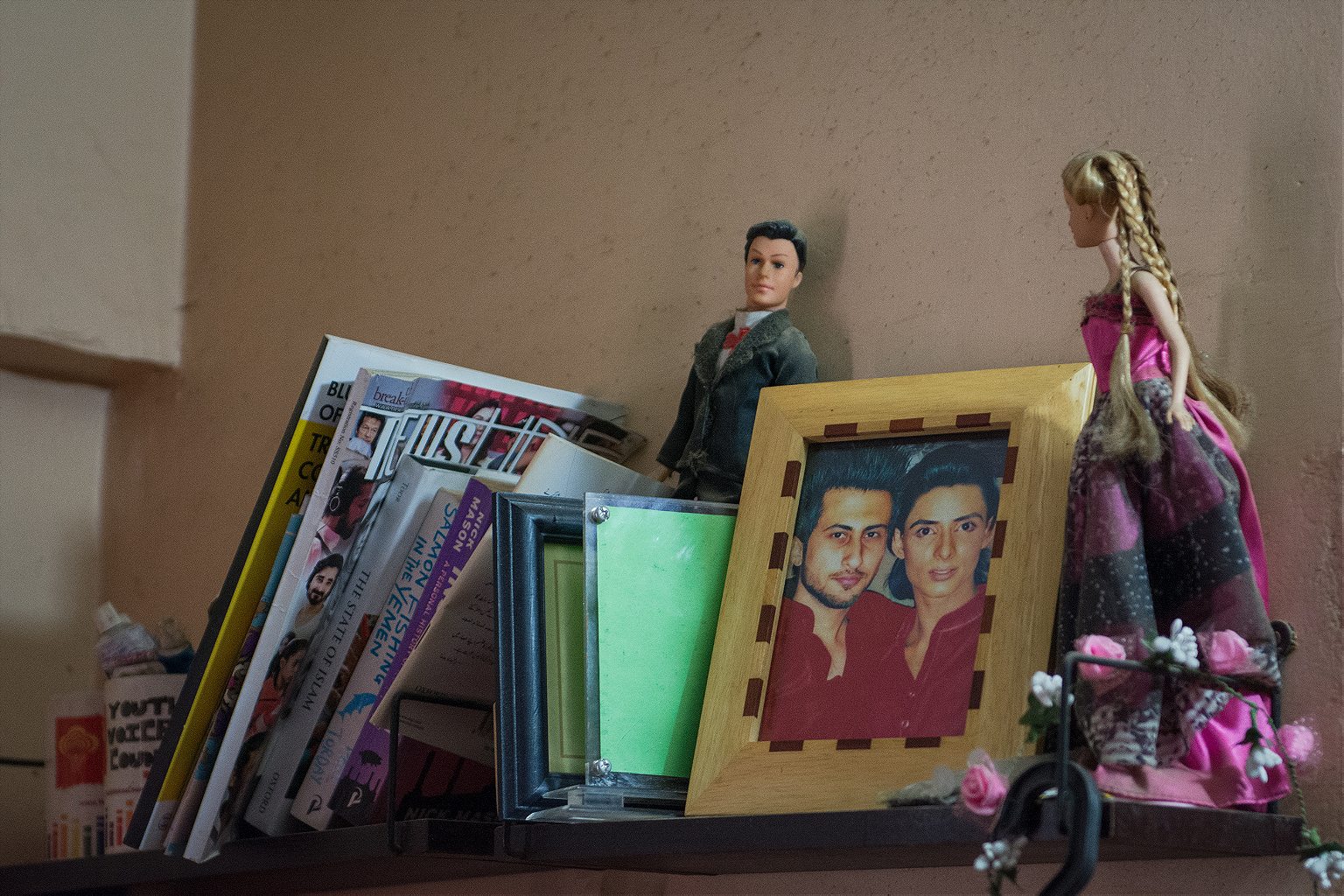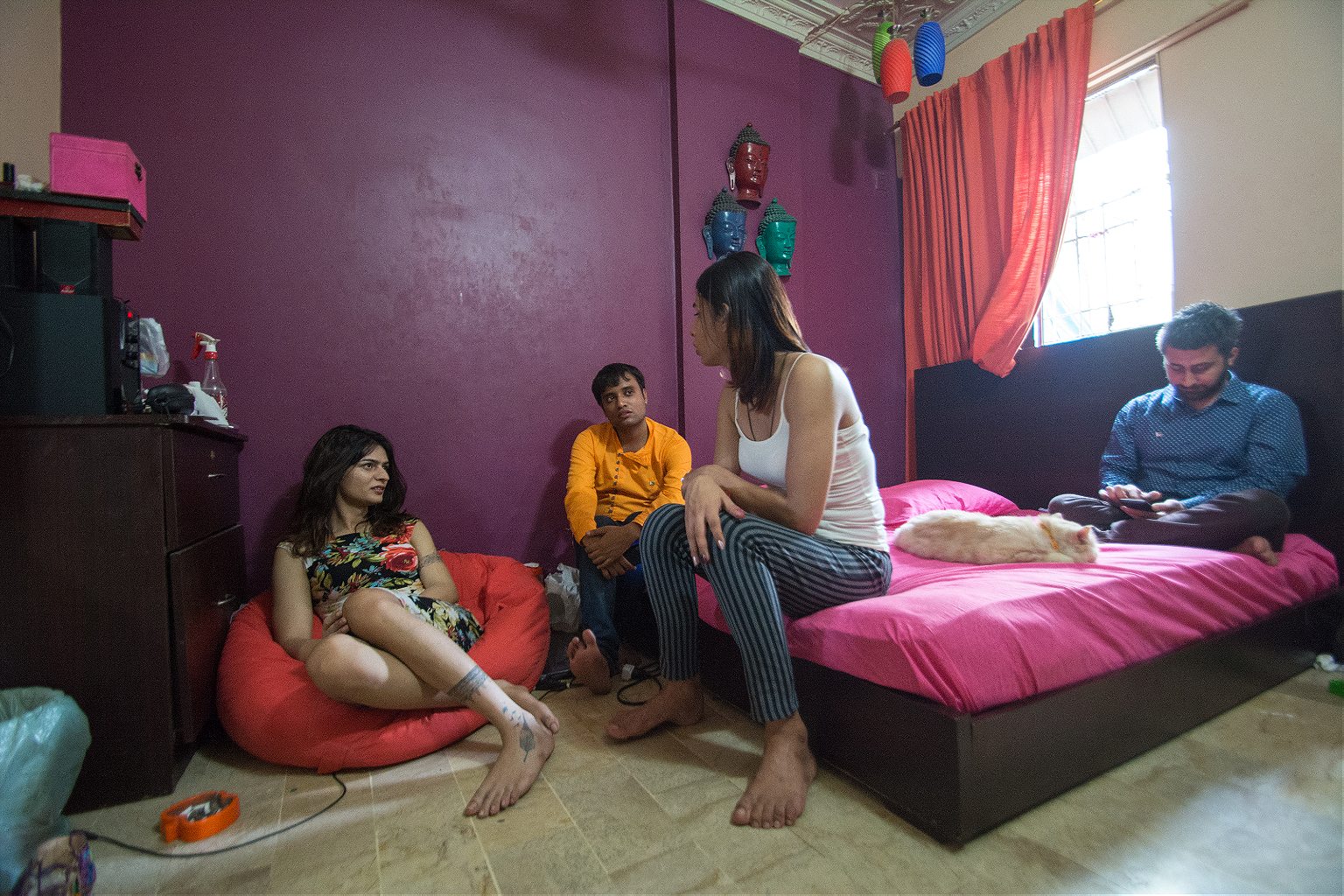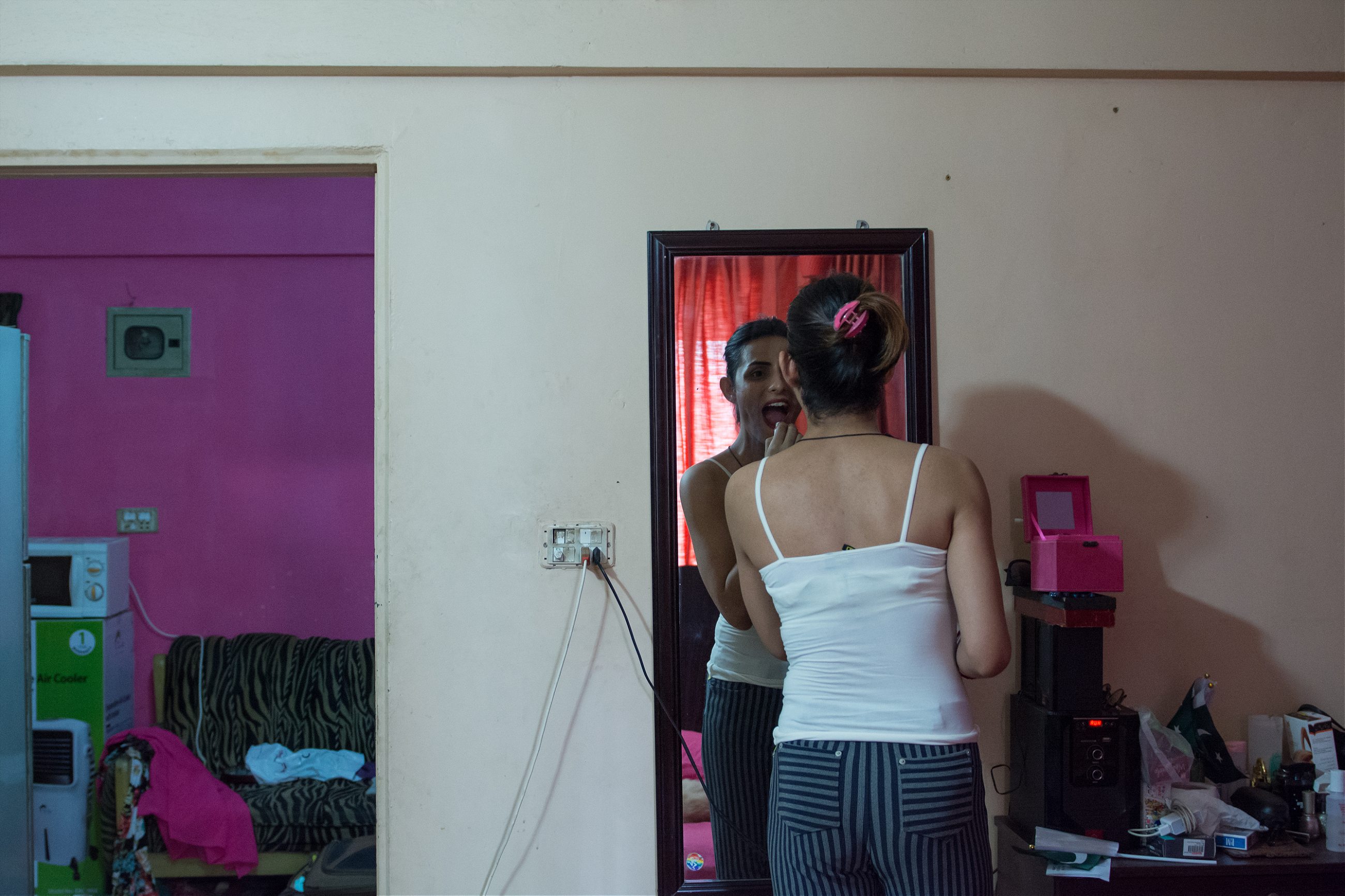Meet the power couple fighting for Pakistan’s LGBTQ community.
It is past midnight when the convoy of buses and cars finally turns off the highway onto an unpaved road in the Pakistani nowhere and comes to a halt at the sturdy walls of a farmhouse. Slowly, a gate opens. Cars are being searched. The security guards look for weapons, alcohol, anything that might create trouble, Kami explains later. She smiles reassuringly at the armed guards. Sid, Kami’s life partner of seven years, readjusts his sunglasses, which are tucked into the collar of his muscle shirt. They wave us through.
In the yard, a dance floor is set up. Make-up is being retouched, and some of the boys disappear, returning as stunning women in evening dresses and lush wigs. Whether they identify as trans women or cross-dressing gays on the label-littered spectrum of sexuality, it is their night, the unofficial finale of the Danish-Pakistani festival AKS. The queer film and arts festival, which was founded by filmmaker Saadat Munir in 2014 in Copenhagen, took place successfully for the second time in Pakistan and the spirits are high. Clandestine alcohol is poured from soda bottles and someone cranks up the music. Kami, a co-organizer of the festival, has donned an elegant black dress. The dance floor fills up. In the back, drivers and guards stand and stare. Occasionally, they are gently reminded not to take photographs, but it doesn’t take long until someone else pulls out his phone.
Transgender people, especially trans women, have long occupied a mythological and socio-biological grey zone in South Asia. In 2012, Pakistan became one of only eleven countries to offer a third-gender option on Pakistani identity cards. Traditionally, this third gender was known as the khwaja sera, biological men who dress and identify as women. More commonly known as hijra in India, Hindu mythology says that the god Rama granted them the ability to bestow blessings in return for their loyalty. A popular misconception of trans women is that they are eunuchs or hermaphrodites, sometimes a protection of sorts in a society which harshly condemns homosexuality and finds a seemingly voluntary renunciation of male privileges hard to fathom. Those who follow the ancient tradition of the third gender, which is only partly defined by the prefix “trans,” often come from lower social classes and usually live as women in clans, so called guru-chela communities, under the governance of an older trans woman. Despite divine intervention and the tradition being firmly rooted in Pakistani society, the stature of khwaja sera has fallen, and they have few opportunities to earn a living besides begging, dancing or prostitution, further lowering their status. Committing to what they consider their real identity outside the binary of man and woman instantly renders them outsiders, if not outcasts.

Not all trans women belong to a hijra community. However, the stereotypical perception prevails, especially as upper- and middle-class trans people are rarely seen in public. Kami is an exception, a “modern version” of the trans community and “change-maker,” as Sid calls her affectionately. Able and willing to represent herself and the community loudly, boldly, and with style, she is advocating for LGBTQ rights and health awareness in and outside Pakistan.
The air conditioning blasts into the humid summer night as Kami puts her constantly buzzing phone aside and straightens her sleeveless jumpsuit. It’s a few weeks after the dance party and we are having coffee at a progressive cultural center in Karachi. She says she had a choice when she was 22 and figured out who she was: to hide in a gender identity she felt wasn’t her own or to come out and grow a bulletproof skin.
“As a partner, I feel very proud of her and I will support her as much as I can,” says Sid. Kami and Sid have become a power couple in the Pakistani LGBTQ community. Both are outspoken activists and have made their private life a public affair for the cause. As a result, they sometimes face criticism from within the community that they are seeking publicity for their own ends. It stings, although Kami shrugs it off with a smile and turns to fiddle with her phone again. “That’s called life, darling! And people get jealous.” But then she looks up and asks, “If we don’t accept ourselves, who will?”

“Most [LGBTQ] people are scared to be in the spotlight,” Sid says calmly, leaning on the up-cycled wooden cable reel which functions as table. “What we do is not only for us, the whole community benefits from it. But we cannot do it alone.” He looks at Kami. “We need the community to rise and raise their voice. Without visibility it is difficult to achieve our rights. If people come out of the closet, we will not be a minority anymore.”
Violence and discrimination are still far too common. At the end of July, a trans woman who refused to pay a bribe was harassed and sexually molested by police in Peshawar, a local activist group reported. Only a couple of months earlier, trans activist Alesha, who, like Kami and Sid, went only by her first name for safety reasons, was shot in Northern Pakistan and ultimately succumbed to her injuries because the hospital couldn’t decide whether to treat her in the women’s or men’s ward. Her desperate friends recounted being asked if they danced for money while fighting for Alesha’s life. And the strict security at the farm, a rented events venue, wasn’t just for show. When a friend from the community celebrated her birthday there, armed men entered the premises, took some of the trans women hostage, and raped them.
Rape is largely accepted as unavoidable
Rape, or “surprise sex” as it’s colloquially downplayed, is largely accepted as unavoidable, Sid says matter-of-factly over dinner at a hip street restaurant that serves traditional Pakistani food on enamel vintage plates. Kami estimates that the majority of Pakistan’s population were abused as children or have been sexually harassed at some point in their life. Sexual frustration and oppression are burning topics in the unofficial discourse of today’s Pakistan. Especially in lower social classes and rural areas, gender segregation and arranged marriages are common, while sexual education initiatives only slowly gain acceptance. In part because open conversations about sexuality are taboo, attacks on vulnerable members of society are often ignored.
On the other hand, access to reproductive healthcare or birth control is easy and relatively cheap for women and there are surprisingly large numbers of male health clinics spread across the country that provide condoms, S.T.D. testing, and counseling. Both Kami and Sid work for such organizations, Naz Male Heath Alliance (NMHA) and Humraz Male Health Society, respectively, which are part of greater national and international networks.
Friends join the table. Kami calls everyone darling, and Ali, a well-known human rights lawyer, passes around photos on his phone. He has been working with Kami and Sid on an educational documentary about people with different sexual orientations. Kami mentions that she was recently denied a visa to South Africa, where she was supposed to speak at a conference about HIV and male health. It’s a common occurrence, and often the embassies do not explain their reasoning for denying travel visas.
“I have one wish,” Sid says dreamily, “to go to Paris…”
“Don’t you dare to say without me,” Kami snaps across the table.
“…to go to Paris and have dinner with Kami in front of the Eiffel tower,” he finishes, unperturbed. Kami sniffily calls him “romantic” and the others grin. Their affectionate banter is nothing new.

While a few laws protecting the transgender community have been passed in the last couple of years, and a recently announced—albeit disputed—fatwa allows for transgender marriage and forbids discrimination, homosexual acts are still illegal in Pakistan, a legacy of British colonial rule spiced up by Sharia law. Gay sex, however, is pretty much omnipresent. In a society as deeply segregated and fiercely patriarchal as Pakistan’s, initial sexual experiences often happen with the same sex. Male prostitutes of all ages disguised as ‘masseurs’ are common, but most gay men and women live in the closet.
For Kami and Sid, this was never an option. When they met seven years ago, Kami was 19, a “cute gay boy” who fell in love with Sid, the slightly older guy with the soft voice and strong opinions who was interested in anything but a serious relationship. “Until I came along,” says Kami, and flips back her shoulder-length hair. Three years into the relationship and after painstaking self-reflection and research, Kami finally realized that she wasn’t crazy, as she had assumed through puberty, but that “gay” didn’t suffice either, and that she identified most genuinely as “she.” Sid, who says they were lucky to explore themselves and their sexuality at a young age, supported the person he had fallen in love with, man or woman.
That’s not to say there are never issues. Sometimes, Sid stumbles over the personal pronoun when talking about his lover. In front of Kami’s family, Sid presents as Kami’s “best friend” and refers to her as “he,” and Kami doesn’t present herself as a woman. Out of respect, they say. As openly as they promote their sexual identities and relationship to the outside world, their families don’t know. Or rather, pretend not to know. During the week, while Sid works in another city, Kami usually stays with her relatives. She may not wear make-up and dresses around them, but it’s something of an open secret. It’s only a matter of time until her nieces and nephews discover her public Facebook page.

Earlier in the day, Kami and Sid had gone to support a feminist initiative, a gathering in a park. Young people, mostly students, sat on the grass, played guitar, and drank tea to promote the re-appropriation of Karachi’s contested urban space; in short, the right to hang out in public for both men and women. Several of the young women came up to Kami to say hi and take a picture with her. Many of them had joined the wake and protest after Alesha’s murder. It is then, Kami says, that the impact of their work shows. When the individual groups blend and it’s not only about trans people, or feminism, but the society as a whole, that’s when change becomes palpable.
A few weeks earlier, Kami and Sid had gone to hang out at a mall. They went shopping, had lunch, everything couples do in a society that provides only limited options for dating under the watchful eye of the public. “We fooled the whole mall,” Sid chuckles. “They assumed we were a straight couple.” It is this normality that they crave. Like getting married in an Islamic ceremony that is in compliance with Sharia law. An imam in South Africa agreed to wed them, and they are hoping to get there this year for another conference. Now, only the admittedly major issues of money and visas have to be sorted out. Kami, the self-declared non-romantic, looks at Sid. “It’s not easy. But a dream is a dream.”